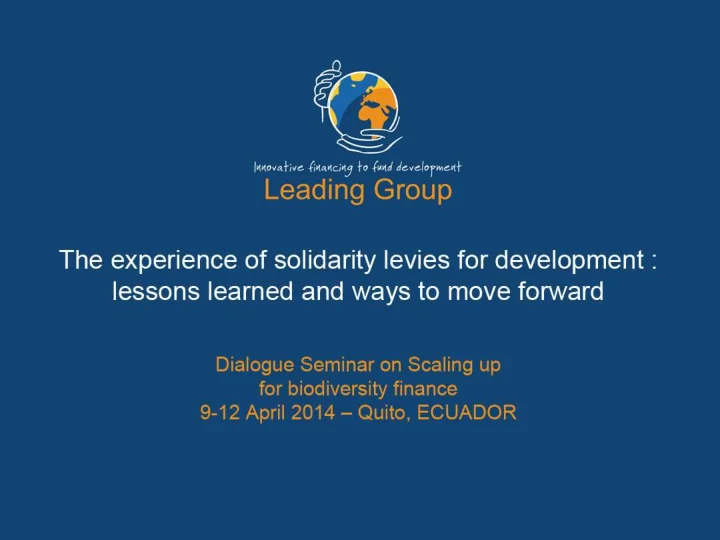

The Leading group • 64 member countries, international organizations, foundations and NGOS. France holds the Permanent Secretariat • An informal platform of exchange of good practices • Promoting the scaling up of existing initiatives and encouraging political mobilization at the international level • Priorities for 2014: – Contributing to the design of a strategy of implementation of the post 2015 agenda – Focus on climate change
What is innovative financing according to the Leading group ? • Limits of traditional aid flows to acheive sustainable development need to find solutions to address the specific challenges of global public goods • Need to find a response to a double challenge : – Scarcity of resources for sustainable development – Need of efficiency of available resources • A set of principles: multistakeholder approach/design new tools to address unsolved problems/diffuse and capitalize on successful initiatives
More money / smarter money Two sub-categories of innovative financing can be highlighted: • Innovative sources of financing which help generating new resources for development as a complement to existing budgets • Innovative mechanisms of financing which allow maximizing the leverage and/or the impact of available resources, through partnerships with the private sector for instance
Solidarity levies • Relying on economic sectors which most benefitted from globalization redistribution of wealth • Addressing global challenges with global players and instruments
Where is the innovation? • After being collected, revenues from both the FTT and the air ticket levy are transferred to a special fund: – The Solidarity Fund for Development (managed by the French Development Agency) – Allocation formalized through a Decree – No transit in the national budget Ring-fencing of resources
Where is the innovation? • Predictibility of resources raised • Making possible contributions from prosperous globalized activities
The Financial Transaction Tax (FTT) • First mentionned by James Tobin in 1972 as a way to limit speculation on financial markets, the idea of an FTT has gained importance over the past decade: – A moral decision in the context of the economic and financial crisis – An innovative way to raise more funds for sustainable development, as a complement to national budgets
The FTT – what we have achieved • Demonstration of its technical feasibility thanks to various expert reports and the mobilization of the civil society • Political acceptance (Bill Gates Report to the G20 in 2011, Proposal by the European Commission) • Introduction of an FTT partly allocated to development in France (August 2012) • Project of « enhanced cooperation » at the European level
The French FTT • Modalities: – 0.2% on shares transactions of French companies with market capitalization > 1 billion € – 0.02% on CDS • 706 million € raised in 2013 • Allocation : 90% to general budget, 10% to development : – Global Fund, GAVI, Health project in the Sahel region (I3S), RWSSI (African Development Bank) • Way forward in 2014 : – 10% 15% ; allocation to climate
The FTT – remaining challenges • Persisting political reluctance and strong opposition from the Financial sector. Topic lost importance in the G20 debates. • Project of European FTT delayed and challenged: – How to tax derivative products? – Potential impact of the FTT on the common market? • Effective allocation of revenues to sustainable development?
How to move forward? • Gradual implementation at the European level • Keep working on transparency issues on financial markets • Examine other existing options : stamp duties, tax on financial activity, tax on currency transactions, etc. • Keep encouraging mobilization of the civil society at the international level
How to move forward? “What is innovative financing? It is anything that can help generating money for development in addition to government budgets. ” Bill Gates, Paris, April 2014. “FTTs already exist in many countries, where they generate significant revenue, so they are clearly technically feasible. ( … ) It is critical that a portion of the money raised be reserved for investments in development. ” Bill Gates Report to the G20, 2011.
The air ticket levy • An excellent example of operational and successful initiative of innovative financing for development: – No damage caused to air traffic – Simplicity of modalities of implementation – Considerable amount of resources raised – Stability – Adaptable in various contexts
What we have achieved • 9 countries: 6 African States (Cameroon, Republic of Congo, Madagascar, Mali, Mauritius and Niger) + Chile, France and South Korea • Total raised : 1.25 billion Euros in France / close to 70 million USD in other countries. • Support of air companies such as Air France • Allocation to UNITAID
How to move forward? • Keep advocating about the results in terms of resources raised, stability of funds and easy implementation • Several countries are studying the possibility of introducing the instrument : Japan, Nigeria • Examine new areas that could benefit from the resources collected
Conclusion • Very useful and effective tools in the field of global health • Allow to generate more and smarter money • Only a complement to broader reforms and actions to achieve sustainable development
Recommend
More recommend